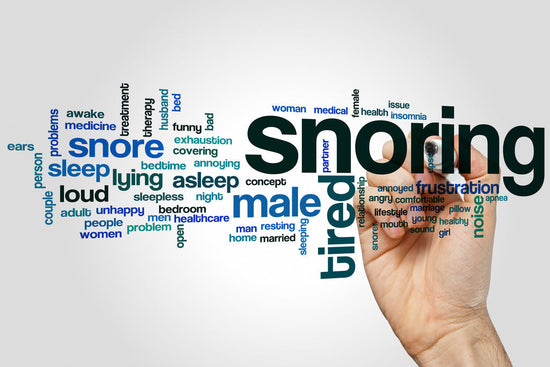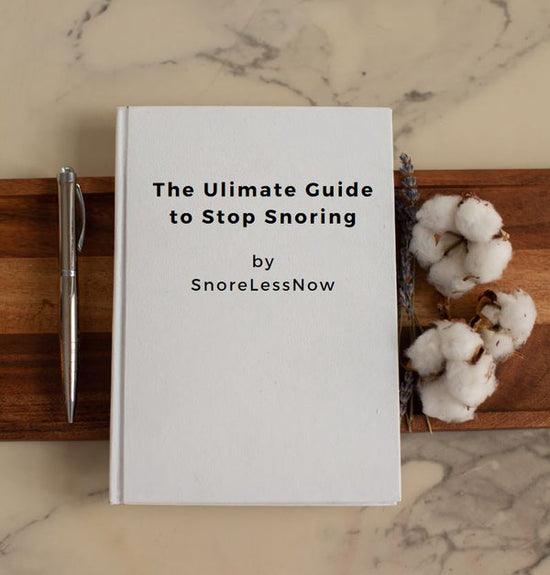In today's fast-paced, sleep-deprived society, the importance of a good night's sleep cannot be overstated. However, for millions of Americans, the peaceful silence at night is replaced by the disruptive noise of snoring. Furthermore, the cause of this noisy nuisance is often linked to a very common problem: nasal congestion.
This blog post aims to dissect the intricate relationship between nasal congestion and snoring, shedding light on their causes and impacts on health and offering practical, affordable solutions to mitigate these issues.
By understanding the core of the problem, you'll be better equipped to take control of your nighttime nuisance and wake up feeling refreshed and ready for the day. We'll explore proven techniques to reduce snoring, the variety of anti-snore devices available, and how to select the right device for your needs. Let's dive in.

Understanding Nasal Congestion and Its Causes
Nasal congestion, or a 'stuffy nose,' is a common condition that affects people of all ages. It occurs when the tissues and blood vessels in your nasal passages become swollen with excess fluid, resulting in a 'stuffed up' feeling. This congestion can make breathing difficult for you and lead to discomfort, especially when trying to sleep.
Multiple factors can cause nasal congestion. The most common are viruses, such as the common cold or the flu. These illnesses cause your body to produce more mucus and inflame your nasal tissues, leading to congestion. Other causes include allergies, sinusitis, and non-allergic rhinitis. Unhealthy lifestyle habits, such as smoking or excessive alcohol consumption, can also contribute to chronic nasal congestion.
Environmental irritants like dust and pollution can further exacerbate the problem. Exposure to these substances can cause an inflammatory response in your nasal passages, leading to congestion. Medications such as certain blood pressure drugs and hormonal changes, particularly in pregnancy, can also lead to a stuffy nose.
Snoring: Causes and Impact on Health
Snoring is a common issue that affects millions of people worldwide. At its simplest, snoring is the sound that results from partially blocked air movement during breathing while sleeping.
Snoring can occur for several reasons. When you're asleep, your throat muscles relax, your tongue falls backward, and your throat becomes narrow and "floppy." As you breathe, the walls of the throat begin to vibrate. These vibrations lead to the characteristic sound of snoring. The narrower your airway becomes, the greater the vibration and the louder the snoring.
Aside from being a nuisance to your bed partner or anyone who sleeps near you, snoring can negatively impact the quality of your sleep, leading to daytime fatigue, irritability, and increased health problems. Regular, loud snoring is also a common symptom of Obstructive Sleep Apnea (OSA), a serious sleep disorder that requires medical attention.

The Connection Between Nasal Congestion and Snoring
A connection exists between nasal congestion and snoring due to the physical obstruction caused by the congestion. When the nasal passages are blocked, your body naturally compensates by switching to mouth-breathing. This change leads to greater relaxation of throat muscles and the subsequent onset of snoring.
The presence of nasal congestion, therefore, significantly increases the likelihood of snoring. It restricts the air passage through the nose, leading to disturbed sleep and snoring. Hence, effectively managing nasal congestion can reduce snoring, improving sleep quality and overall health.
Proven Techniques to Reduce Snoring
To alleviate the distressing cycle of nasal congestion and snoring, various proven techniques can help. First, lifestyle changes can significantly impact the frequency and intensity of snoring. Maintaining a healthy weight can reduce fat around the neck, reducing the pressure on the throat and minimizing the chances of snoring.
Avoiding alcohol, sedatives, and sleeping pills can also prove beneficial as these substances relax the muscles in the throat and interfere with breathing. Additionally, establishing regular sleep patterns can enhance sleep quality and minimize the likelihood of snoring.
Secondly, addressing nasal congestion can dramatically reduce snoring severity. Over-the-counter saline nasal sprays can help keep your nasal passages open and allow you to breathe more efficiently. Similarly, using a humidifier in your room can help keep your throat moist and lessen congestion, subsequently reducing snoring.
Shop Snoring Devices: How to Choose the Right One
With a wide array of snoring solutions available, choosing the right anti-snore device can be overwhelming. Several factors can guide your search for the most effective, comfortable, and affordable snoring device.
Primarily, understand the root cause of your snoring. A nasal dilator might be an effective solution if nasal congestion is the primary culprit. MADs or TSDs may be more appropriate for more severe cases of snoring.
Always consider your budget when choosing a snoring solution. While some devices can be pricey, affordable snoring devices that do not compromise on effectiveness and comfort are available. Reading product reviews and ratings can provide valuable insights into the user experience and device efficacy.
Conclusion
Snoring and nasal congestion are interrelated issues that can significantly impair sleep quality, leading to various health issues. Understanding their connection is the first step toward finding effective, affordable solutions. Lifestyle changes, medical interventions, or the use of an anti-snore device can alleviate these problems and drastically improve the quality of sleep and overall health.
It is vital to remember that while snoring may seem like a minor nuisance, it can be a sign of more severe health issues. If your snoring is severe or accompanied by sleep apnea symptoms, it is essential to seek medical advice. As we continue to advance in the medical field, more and more solutions are becoming available to those suffering from these conditions. Always consult with a healthcare professional to find the best solution for you.
FAQ
Can nasal congestion make you snore?
Yes, nasal congestion can make you snore. When your nose is blocked, you may have trouble breathing through it while you sleep. This can force you to breathe through your mouth, which can make the tissues in your throat vibrate and cause snoring. So, if you have a stuffy nose, it can make you snore.
How can I decongest my nose while sleeping?
If you want to decongest your nose while sleeping, here are a few things you can try. First, prop up your head with an extra pillow or raise the head of your bed a little bit. This helps the mucus in your nose drain better and can reduce congestion. Second, use a humidifier in your bedroom to add moisture to the air. This can soothe your nasal passages and make it easier to breathe. Third, you can use adhesive nasal strips or a nasal dilator. These solutions help open up your nose so air can flow more freely. Another option is using a saline nasal spray to moisten your nasal passages and clear out congestion. Lastly, try to keep your bedroom free from things that can make your congestion worse, like dust or smoke. If your congestion doesn't get better, it's a good idea to see a doctor for more help
Are humidifiers good for snoring?
Humidifiers can be helpful for snoring sometimes. When the air is dry, it can irritate the nose and throat, making snoring worse. Using a humidifier adds moisture to the air and can make breathing easier. But remember, not all snoring is caused by dry air. There are different reasons for snoring, like how you sleep or if you're overweight. If you snore a lot and the humidifier doesn't help, it's a good idea to talk to a doctor. They can figure out why you snore and suggest other things that might help you.





